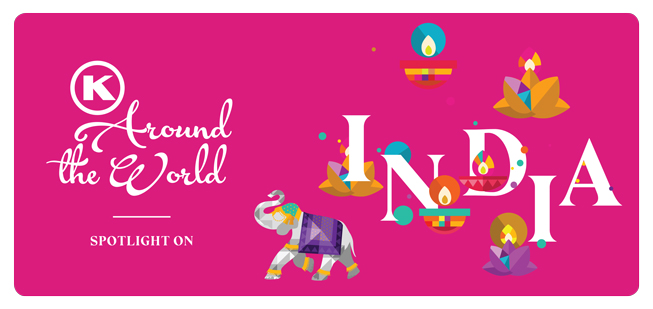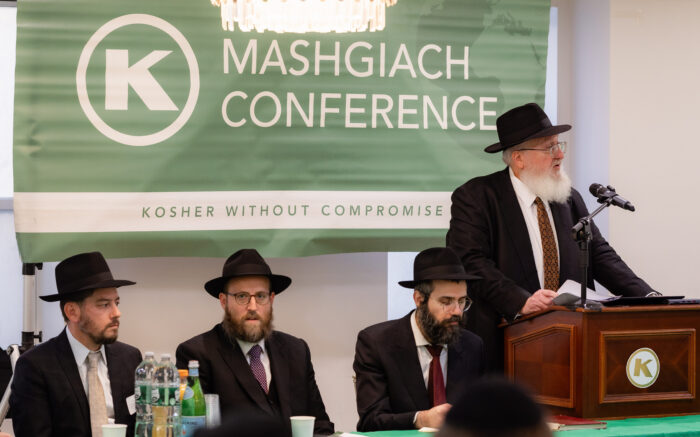OK Kosher is proud to be an industry leader with a global reach and presence. One region with a particularly fast-growing interest in kosher certification is India, where the OK has been certifying manufacturing companies for several decades.
Food is a big part of Indian culture and we make it our mission to bring an ever-growing selection of kosher foods to consumers with discerning kosher standards. To comply with our kosher standards, OK Kosher certified companies in India very often need to put in extra ongoing effort on their part. Each time new ingredients need to be sourced, which can be quite often compared to other regions, or ingredients from a new supplier need to be added, our clients are required to obtain our written approval which, in some cases, requires in-depth research on our part. They are also tasked with being on top of the required digital submissions1 to obtain individual approval for each of their ongoing bulk shipments. This ultimately allows for a vast number of kosher products across the world to be produced with kosher ingredients made in India.
At first, Rabbinic Coordinators from OK Kosher Headquarters in New York managed these certifications and conducted the initial and annual executive visits. Our local rabbinic field representatives in India served as the boots on the ground for unannounced inspection visits. Among these rabbis was Chabad of Mumbai’s Rabbi Gavriel Holtzberg, ד“הי ,who took a lead role in this capacity until his tragic murder at the hands of terrorists in 2008. Rabbi Yisroel Kozlovsky,’שיחי , who now heads Chabad of Mumbai, also conducts visits for OK Kosher certified companies in India.
For the past ten years, the OK affiliate division in India is headed by Rabbi Avraham Rapoport, who also serves as OK Kosher’s Operations Manager at the regional affiliate office in Israel. Rabbi Rapoport has successfully established a solid team of expert mashgichim dedicated to the India region and shared some of his methods with us. “My process begins with assigning a mashgiach to each facility, who will become acquainted with the intricacies of the production, including how the machinery works. This mashgiach remains the long-term representative supervising the given facility. This is a standard unique to the top kosher certifiers and by no means a standard practice with every agency, especially in India.” It’s no small achievement given the proximity of qualified individuals for the job and the amount of travel and logistical complexity involved.
Nothing can be taken for granted in the food industry. Manufacturers are not always obligated by authorities to list every additive on their labels, therefore the rabbi must not only be knowledgeable but diligent in his pursuit of information. Rabbi Rapoport personally visits India frequently himself, to inspect and review the work of his team. Rabbi Eli Lando, Executive Manager of OK Kosher, made his first trip to India on behalf of the OK right before Purim 5780, accompanying
Rabbi Rapoport and senior mashgiach Rabbi Shlomo Sharon on their visits.
Rabbi Lando spoke with Kosher Spirit recently about his trip: “While I was in India, I joined a visit to Godrej Group and VVF, two of the largest oleochemicals conglomerates in India, based in Mumbai. I met with both of their management teams. It was inspiring and encouraging to see how proud both of these companies are of their relationship with Rabbi Rapoport, his team, as well as OK Kosher at large.”
Oleochemicals refer to chemicals derived from natural oils and fats, which, when kosher, are derived from vegetable oils. Certifying these products in India presents some unique potential challenges. The procurement of kosher certified raw materials in India, for instance, is far more difficult than in other parts of the world. Most raw material suppliers of vegetable oils in India are not kosher certified.
OK Kosher makes many visits by qualified, trained mashgichim regularly throughout the year to supplier sites across the country. This is to verify the kosher status of their products for our certified clients to be able to buy approved and supervised ingredients from them. Bulk liquid shipment, often referred to as ISO tank2 shipment, of vegetable oils is also quite common in this industry. This is a central piece of any kosher certification of oleochemicals, as the status of the tankers ultimately affects the kashrus of the end product.
We verify each shipment before it is loaded and shipped, and then re-verify it at the receiving port. Every oil shipment is traced, and every step of the supply chain is documented for traceability before approval.3 These are just a few examples of the amount of work that goes into certifying oleochemicals in India.
Mr. Vijay Kumar, one of our main kosher contacts at Godrej Group, warmly recalled a story from one of the first times Rabbi Rapoport visited. They were traveling together by train and, when he began to daven Shacharis on board, Mr. Kumar reminisced about OK Senior Rabbinic Coordinator, Rabbi Leizer Teitelbaum OB”M having done the same on his visits to India over 20 years prior. He vividly remembered the image of Rabbi Teitelbaum praying with his tallis and tefillin all those years ago. One can imagine the many unique and remote places in which rabbis in kashrus have brought kedushah in the world where a Jew may never have davened or even set foot before.
Although there aren’t many kosher consumers living in India, Godrej Group nevertheless makes a point of displaying the OK Kosher symbol on locally distributed consumer goods (not just those for export). They are proud to show the world the kosher status of their products.
Rabbi Shlomo Sharon, our senior regional mashgiach for over a decade, shared how he became involved with OK Kosher’s India division. “As a university student, I studied for a degree in chemistry. Only years later did I realize how helpful this background would be for my eventual work in kosher supervision! This was truly Hashgacha Pratis.” In addition, having grown up with Indian-Jewish roots, he understands the local customs and mentality of the companies he visits. He can speak to them in their language and through the lens of their own culture. This plays a big role in his ability to educate them about kosher regulation at a high level.
Rabbi Lando’s meetings with clients in India showed that Rabbi Rapoport monitors OK Kosher’s high standards with a personal touch. Rabbi Lando explained the importance of this, sharing, “When a company only fears their inspecting rabbi, there’s a risk that they’ll withhold information, as they’re not sure what should and shouldn’t be said. However, when the relationship involves both respect for our authority as well as camaraderie, then a bond is formed and kashrus is naturally improved as a result. This approach as you can see, makes a huge difference, as is evident in Rabbi Rapoport’s work.”
As I wrapped up my conversation with Rabbi Lando, he had a final thought to share with our readers. “During the week Rabbi Rapoport and I spent in India together, Rabbi Don Yoel Levy, OB”M, was visiting Singapore, conducting kosher inspections there. Rabbi Levy derived much nachas ruach upon hearing the
positive feedback about the OK’s Indian division. Even though India possesses its unique challenges to kosher certification, under Rabbi Levy OB”M’s, and now the Vaad HaKashrus’, leadership, OK Kosher continues to further our internationally-renowned standards without any compromise based on local circumstances. It is important for the average consumer to understand the amount of time and effort that kosher agencies, plant personnel, and manufacturers dedicate to their jobs to maintain strict adherence to the laws of kashrus. The OK’s operations in India are a prime example of this level of dedication and commitment, and I’m glad to share a glimpse of it with you.”
1. Like ISO tank requests, explained later in this article.
2. An ISO Tank is a tank container which is built to the ISO standard (International Organization for Standardization). ISO tanks are designed to carry liquids in
bulk, both hazardous and non-hazardous. The tank is made of stainless steel and is surrounded by various types of protective layers.
3. For more information about kosher transport, see the Tishrei 5781 issue of Kosher Spirit.


 EN
EN  ZH
ZH  KR
KR  BR
BR  ES
ES  IN
IN  IL
IL 




